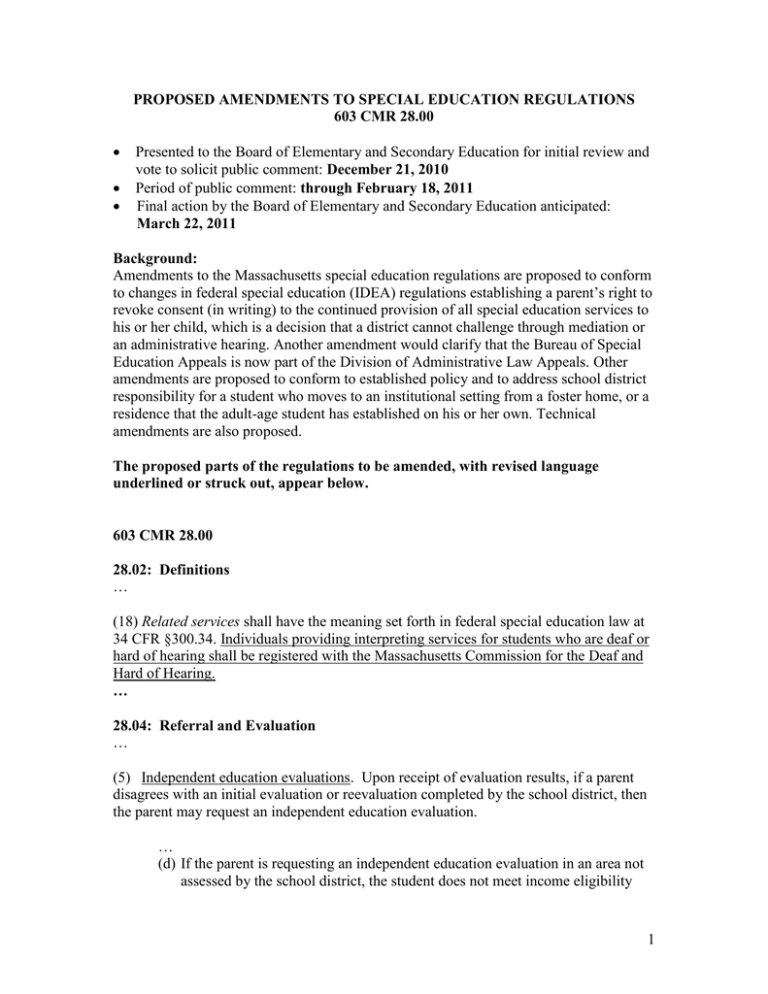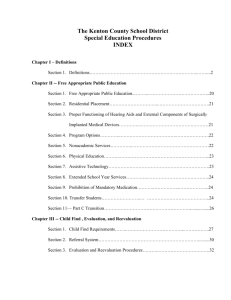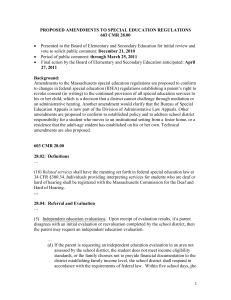PA SpecEd603CMR28
advertisement

PROPOSED AMENDMENTS TO SPECIAL EDUCATION REGULATIONS 603 CMR 28.00 Presented to the Board of Elementary and Secondary Education for initial review and vote to solicit public comment: December 21, 2010 Period of public comment: through February 18, 2011 Final action by the Board of Elementary and Secondary Education anticipated: March 22, 2011 Background: Amendments to the Massachusetts special education regulations are proposed to conform to changes in federal special education (IDEA) regulations establishing a parent’s right to revoke consent (in writing) to the continued provision of all special education services to his or her child, which is a decision that a district cannot challenge through mediation or an administrative hearing. Another amendment would clarify that the Bureau of Special Education Appeals is now part of the Division of Administrative Law Appeals. Other amendments are proposed to conform to established policy and to address school district responsibility for a student who moves to an institutional setting from a foster home, or a residence that the adult-age student has established on his or her own. Technical amendments are also proposed. The proposed parts of the regulations to be amended, with revised language underlined or struck out, appear below. 603 CMR 28.00 28.02: Definitions … (18) Related services shall have the meaning set forth in federal special education law at 34 CFR §300.34. Individuals providing interpreting services for students who are deaf or hard of hearing shall be registered with the Massachusetts Commission for the Deaf and Hard of Hearing. … 28.04: Referral and Evaluation … (5) Independent education evaluations. Upon receipt of evaluation results, if a parent disagrees with an initial evaluation or reevaluation completed by the school district, then the parent may request an independent education evaluation. … (d) If the parent is requesting an independent education evaluation in an area not assessed by the school district, the student does not meet income eligibility 1 standards, or the family chooses not to provide financial documentation to the district establishing family income level, the school district shall respond in accordance with the requirements of federal law. Within five school days, Tthe district shall either agree to pay for the independent education evaluation or within five school days, proceed to the Bureau of Special Education Appeals to show that its evaluation was comprehensive and appropriate. If the Bureau of Special Education Appeals finds that the school district’s evaluation was comprehensive and appropriate, then the school district shall not be obligated to pay for the independent education evaluation requested by the parent. 28.06: Placement and Service Options … (9) Educational Services in Institutional Settings. The Department shall provide certain special education services to eligible students in certain facilities operated by or under contract with the Department of Mental Health, the Department of Youth Services, County Houses of Corrections, or the Department of Public Health. The Department shall retain the discretion to determine based upon resources, the type and amount of special education and related services that it provides in such facilities. (a) Decisions about admission to and discharge from institutional facilities are within the authority of institution administrators, not the school district. However, Public school districts are not relieved of their obligations to students in such settings. Although admission and discharge decisions in such facilities are not within the jurisdiction of the public school district, students in institutional settings remain the responsibility of the school district where the father, mother or legal guardian resides and School districts are responsible for students in institutional settings in accordance with 603 CMR 28.10. Such students have the same rights for referral, evaluation, and the provision of special education in accordance with state and federal law as students in public schools. (b) Non-educational services such as residential, medical and clinical services shall be provided by the state agency that controls the facility. The provision of such services shall be governed by the state agency in accordance with applicable laws, interagency agreements, or agency policies. (c) Where a student's IEP requires a type or amount of service that the facility does not provide, it shall remain the responsibility of the school district where the father, mother or legal guardian resides, except as provided in 603 CMR 28.10(3)(c)1 and 2, to implement the student’s IEP by arranging and paying for the provision of such services. (d) The responsible school district where the father, mother or legal guardian resides shall be responsible to coordinate with the Department and to ensure that 2 the student receives an evaluation, an annual review, and special education services as identified by the Team at a Team meeting convened by the responsible parent’sschool district. The Department shall participate in Team meetings for any student receiving special education services in an institutional setting. To the extent that special education services are provided by the Department in such facilities, the Department will make every effort to provide services consistent with the student’s IEP and available resources. … 28:07: Parent Involvement (1) Parental consent. In accordance with state and federal law, each school district shall obtain informed parental consent as follows: (a) The school district shall obtain written parental consent before conducting an initial evaluation or making an initial placement of a student in a special education program under 603 CMR 28.00. Written parental consent shall be obtained before conducting a reevaluation and before placing a student in a special education placement subsequent to the initial placement in special education. 1. The school district shall obtain consent before initiating extended evaluation services as described in 603 CMR 28.05(2)(b). 2. A parent may revoke consent at any time. Except for initial evaluation and initial placement, and as prescribed by 603 CMR 28.00, consent may not be required as a condition of any benefit to the student. 3. Parents have the right to observe any program(s) proposed for their child if the child is identified as eligible for special education services. 4. A parent may discontinue special education and related services provided to his or her child by notifying the school district in writing that the parent revokes consent to the continued provision of all special education and related services to the child. The school district shall respond promptly by sending notice to the parent of the district’s intention to discontinue all special education and related services to the student 10 school days from the date of the district’s notice based on the parent’s revocation of consent. The school district may not challenge the parent’s decision through the dispute resolution processes provided under 603 CMR 28.08. Nothing in this regulation shall prevent a school district and a parent from meeting to discuss discontinuation of all special education and related services provided the parent’s participation is voluntary. (b) If, subsequent to initial evaluation and initial placement and after following the procedures required by 603 CMR 28.00, the school district is unable to obtain 3 parental consent to a reevaluation or to placement in a special education program subsequent to the initial placement, or the parent revokes consent to such reevaluation or placement, the school district shall consider with the parent whether such action will result in the denial of a free appropriate public education to the student. If, after consideration, the school district determines that the parent’s failure or refusal to consent will result in a denial of a free appropriate public education to the student, it shall seek resolution of the dispute through the procedures provided in 603 CMR 28.08. Participation by the parent in such consideration shall be voluntary and the failure or refusal of the parent to participate shall not preclude the school district from taking appropriate action pursuant to 603 CMR 28.08 to resolve the dispute. This provision shall not apply if the parent has revoked consent to all special education and related services as provided in 603 CMR 28.07(1)(a)(4). (c) When the participation or consent of the parent is required and the parent fails or refuses to participate, the school district shall make and document multiple efforts to contact the parent. Such efforts may include letters, written notices sent by certified mail, electronic mail (e-mail), telephone call, or, if appropriate, TTY communications to the home, and home visits at such time as the parent is likely to be home. Efforts may include seeking assistance from a community service agency to secure parental participation. The school district shall ensure that its efforts to involve the parent and gain parental consent meet a reasonable measure standard as articulated in federal law at 34 CFR §§300.300(c)(2) and 300.322(d). If the above efforts are attempted and documented and the district is unable to secure parental consent to a reevaluation or placement subsequent to the initial placement in a special education program, the school district shall proceed in accordance with 603 CMR 28.07(1)(b). This provision shall not apply if the parent has revoked consent to all special education and related services as provided in 603 CMR 28.07(1)(a)(4). (d) Nothing in 603 CMR 28.07(1) shall prevent a school district from making a court referral for appropriate action. … 28.08: Continuum of Options for Dispute Resolution … (3) Bureau of Special Education Appeals: Jurisdiction. In order to provide for the resolution of differences of opinion among school districts, private schools, parents, and state agencies, the Bureau of Special Education Appeals, pursuant to G.L. c. 71B, §2A located with the Department, shall conduct mediations and hearings to resolve such disputes. The jurisdiction of the Bureau of Special Education Appeals over state agencies, however, shall be exercised consistent with 34 CFR §300.154(a). The hearing officer may determine, in accordance with the rules, regulations and policies of the respective agencies, that services shall be provided by the Department of Children and Families* Social Services, the Department of Developmental Disabilities*Mental Retardation, the 4 Department of Mental Health, the Department of Public Health, or any other state agency or program, in addition to the IEP services to be provided by the school district. Mediations and hearings shall be conducted by impartial mediators and hearing officers who do not have personal or professional interests that would conflict with their objectivity in the hearing or mediation and who are employed to conduct those proceedings. (a) A parent or a school district, except as provided in 603 CMR 28.08(3)(c) and (d), may request mediation and/or a hearing at any time on any matter concerning the eligibility, evaluation, placement, IEP, provision of special education in accordance with state and federal law, or procedural protections of state and federal law for students with disabilities. A parent of a student with a disability may also request a hearing on any issue involving the denial of the free appropriate public education guaranteed by Section 504 of the Rehabilitation Act of 1973, as set forth in 34 CFR §§104.31-104.39. (b) No later than five days after receipt of a request for hearing or notice that an IEP, or proposed placement, or finding of no eligibility for special education has been rejected by the parent, the school district shall send a copy of such request or notice to the Bureau of Special Education Appeals. The Bureau of Special Education Appeals shall then give notice in writing to the parties of the rights of the parents and school district to request mediation and a hearing. (c) A school district may not request a hearing on a parent’s failure or refusal to consent to initial evaluation or initial placement of a student in a special education program, or on a parent’s decision to revoke consent to the continued provision of all special education and related services to his or her child under 603 CMR 28.07(1)(a)(4). (d) A school district may request a hearing to appeal the Department’s assignment of school district responsibility under 603 CMR 28.10 according to the procedures in 603 CMR 28.10(9). … 28.10: School District Responsibility … (3) School district responsibility based on residence of parent(s) or legal guardian. The school district where the parent(s) or legal guardian resides shall have both programmatic and financial responsibility under the following circumstances: (a) When a student is in a pediatric nursing home. (b) When a student whose IEP requires an out of district placement lives and receives special education services at a special education residential school. 5 (c) When a student lives and receives educational services in a residential an institutional facility (other than a group home or residential school) operated by or, through contract, authorized by the Department of Mental Health, the Department of Public Health, the Department of Youth Services, or the Department of Correction or County House of Correction, except as provided below. In certain of these facilities, the Department of Education may provide special education services, subject to appropriation and resource availability. The responsible school district shall coordinate with the Department to ensure that the student receives an evaluation, an annual review, and special education services as identified by the Team at a Team meeting convened by the school district. The responsible school district is not relieved of its obligations under state and federal special education law because the student is being served by the Department of Elementary and Secondary Education or any other state agency. 1. If an eligible student requiring in-district services had been placed or resided in a Department of Children and Families foster home for at least three months before entering the institutional facility, the school district where the foster home is located shall remain programmatically responsible and the school district where the parents reside shall be financially responsible. 2. If a student is 18 years of age or older and has established his or her own residence as an adult, the school district where the student resided prior to entering the institutional facility shall remain programmatically and fiscally responsible. (d) When a student whose IEP requires in-district services is placed by the Department of Social ServicesChildren and Families in an approved residential school, programmatic and financial responsibility will be with the district where the parent(s) or legal guardian resides. The school district of the city, town or regional school district where such approved residential special education school is located shall provide educational and special educational services to the student in accordance with his or her IEP, shall participate in any Team meetings convened by the school district where the parent(s) or legal guardian resides and shall receive reimbursement from the school district where the parent(s) or legal guardian resides for such services using the procedures of 603 CMR 10.07 to calculate such costs, including transportation expenses where applicable. … *Technical Changes: State agency names shall be revised throughout 603 CMR 28.00 where necessary to conform to recent statutory name changes. 6

